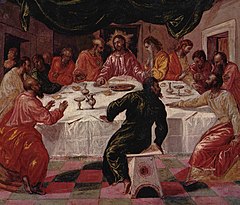New Commandment

The New Commandment refers to the admonition given by Jesus to His Twelve Apostles at the Last Supper, as recorded in the Gospel of John 13:34–35:
A new commandment I give unto you, That ye love one another; as I have loved you, that ye also love one another. By this shall all men know that ye are my disciples, if ye have love one to another
— John 13:34-35 (KJV)
A similar thought was expressed by Jesus two days previously when He spoke at the Temple in Jerusalem and gave what is often called the Shema and the Great Commandment. In response to a lawyer's question, "Master, which is the great commandment in the law?", Jesus answered: "Thou shalt love the Lord thy God with all thy heart, and with all thy soul, and with all thy mind. This is the first and great commandment. And the second is like unto it, Thou shalt love thy neighbor as thyself. On these two commandments hang all the law and the prophets" (Gospel of Matthew 22:35–40).
The "New Commandment", the Wycliffe Bible Commentary states, "was new in that the love was to be exercised toward others not because they belonged to the same nation, but because they belonged to Christ...and the love of Christ which the disciples had seen...would be a testimony to the world".[1]
One of the novelties introduced by this commandment — justifying its designation as New — is that Jesus introduces himself as a standard for love.[2] The usual criterion was "as you love yourself", while the precept asks "as I have loved you". Besides, having Jesus as a model is intrinsically original, as it couldn't precede he himself.
See also
References
- ^ Charles F. Pfeiffer and Everett F. Harrison, eds. (1971). The Wycliffe Bible Commentary. New York: Iversen-Norman Associates. p. p. 341. LCCN 72-183345.
{{cite book}}:|author=has generic name (help);|page=has extra text (help) - ^ "Homily of José Saraiva Martins, Antequera, Spain". The Vatican. 2007-05-06. Retrieved 2008-08-26.
